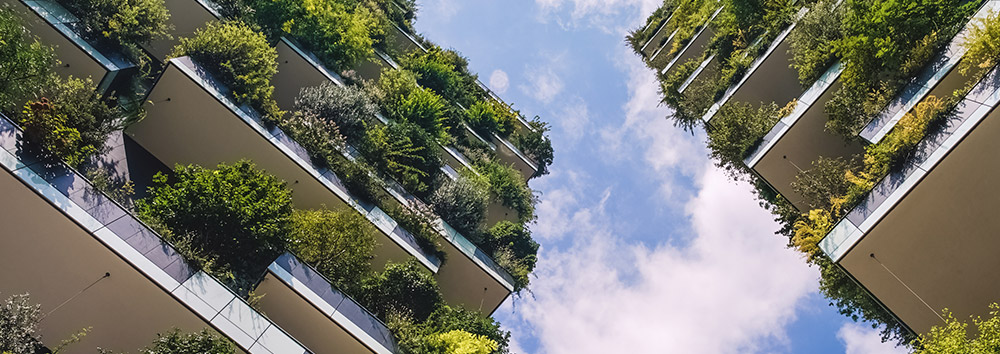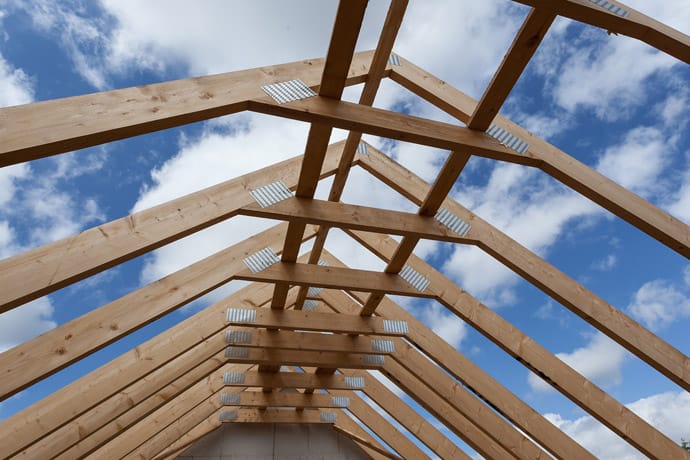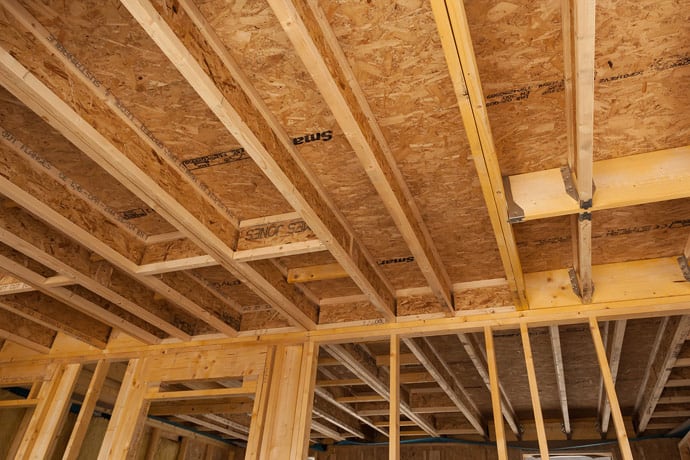
Pasquill’s approach to sustainability echoes the Saint-Gobain sustainability strategy.
As a leading manufacturer of roof trusses and engineered timber solutions, we are committed to reducing our impact on the environment and have set an ambitious target to reach net zero carbon emissions by 2045.
Creating new buildings or retrofitting existing structures with low-carbon, renewable building materials such as environmentally friendly timber is key to reducing emissions in the built environment. When responsibly sourced, timber has a vital role to play as a sustainable building material, and offers a viable, structural alternative to steel, concrete, or other building elements, or assembled solutions.
That is why we are making it easier to specify sustainable timber from Pasquill. For example, the timber and timber products we use in our truss, I-beam and Posi-joist manufacture, is PEFC/FSC® certified chain of custody. This means it comes from independently verified, legal and sustainable sources.
Environmentally friendly timber also acts as a carbon store during a building’s lifetime and is fully biodegradable at the end of its lifecycle.
Some of the other ways we are reducing our carbon footprint and improving sustainability are:
- Our products are manufactured with responsibly sourced timber, certified to quality assurance standards such as ISO14001, and carry Environmental Product Declarations (EPD’s) helping house builders score highly on the Home Quality Mark and BREEAM assessments
- All designs conform to, and reference standards outlined in Eurocode 5, the standard for structural timber
- Fully compliant with the EU Timber Regulations to ensure our timber products are from reputable, verified sources
- We are partners of the Supply Chain Sustainable School, helping improve knowledge of the built environment sector
Learn more about the benefits of off-site, roof truss manufacture and how it reduces waste and improves safety.
The timber and timber products that we use in our truss, I-beam and Posi-joist manufacture is PEFC/FSC® certified chain of custody. This means it comes from independently verified legal and sustainable sources. We can provide the paperwork that proves the journey taken by our timber from the forest to you.
Using certified timber in your projects not only safeguards the world’s valuable timber stocks but also helps your projects gain valuable points in the materials and sourcing areas in the Code for Sustainable Homes.
The auditors of our Chain of Custody scheme are BM TRADA and the schemes are approved by the UK government and recognised by BRE and the Eco Home assessment scheme.
The Home Quality Mark (HQM) is an independently assessed certification scheme for new homes in the UK. It helps house builders to demonstrate the high quality of their homes, awarding certificates with a star rating for the standard of a home’s design, construction and sustainability.
The use of timber helps developers gain materials points under the scheme. For example, our timber meets not only meets the baseline of prerequisite of ‘legally harvested and traded timber’, but also allows housebuilders to score additional credits, by demonstrating ‘responsible sourcing of construction products’ in the assessment phase, and also through the ISO14001 certification scheme. Pasquill also hold an EPD for roof trusses which details the environmental impact of the product throughout its lifecycle and can enable developers to achieve further credits in the ‘Environmental Impact of Materials’ section of the HQM scheme. For the latest information, visit www.homequalitymark.com
All of the topics described above also help to secure BREEAM credits. BREEAM technical standards are the world’s leading sustainability assessment method. They recognise and reflect the value in higher performing assets across the built environment lifecycle, from new construction to in-use and refurbishment.
We also work alongside our customers to develop products to their own green standards, and will continue to design enhanced roof and floor solutions to help meet the zero carbon challenge.
We monitor our carbon emissions and target year-on-year reductions
We take the issue of sustainable development very seriously. As the world leader in designing, manufacturing and distributing construction materials, we are committed to meeting some of the most fundamental challenges faced by the world today. These are: reducing energy consumption; limiting their impact on the environment; and creating a new generation of buildings which are safe, comfortable and energy efficient.
Please view Saint Gobain’s Corporate Social Responsibility Review
It is the policy of Pasquill to produce engineered timber products in the most energy efficient manner possible. View our Energy policy.
Pasquill’s approach to sustainability echoes the Saint Gobain sustainability strategy. We recognise that in being a mature business we need to organise ourselves to meet the challenges of today and the future from an Environmental, Economic and Social perspective. View the Environmental policy.
We are determined to realise our potential and create a truly sustainable business. In order to achieve this we believe it is important to regularly report to our stakeholders on both our ambitions and our progress towards them.
Leadership and development continues to be at the heart of what we do, and our commitment to employee training, health & wellbeing helps us deliver not only better, more sustainable products and services to our customers, but also enables Pasquill to remain resilient, successful and forward looking.
Our core values of ‘Principles of Conduct and Action’ shared by management and employees alike remain the backbone of our business helping us to achieve our vision to be the reference for sustainable habitat.
Pasquill are committed to helping to build a sustainable future. We recognise the importance of modern methods of construction, in particular off-site manufacture in meeting the government’s ambitious sustainable construction agenda.
When responsibly sourced, timber has a vital role to play as a sustainable building material, and we are working hard to promote its use as a viable structural alternative to steel, concrete, or other building elements or assembled solutions.
We are working with our suppliers to ensure we continually improve our environmental performance, whether it be by adhering to strict sourcing policies or finding smarter ways to build, using new or existing products in innovative ways to help solve tomorrow’s construction challenges, today.
Pasquill has embraced the issue of sustainability. Engineered timbers’ importance as both a construction material and build technique has become more prominent as sustainability has gained importance. It complements both brick and block and timber frame construction methods and can demonstrate real and measurable savings when compared with traditional on-site build techniques.
Pasquill operates a strict sourcing policy to only procure timber from ‘legal’ and ‘legal and sustainable’ sources. View our Environmental Timber Policy. We have a continual audit process for Chain of Custody at all our production sites to enable our customers to conform to CPET regulations and government and large contractor procurement criteria. Currently we are able to offer PEFC Roof Trusses and Glulam made from sustainable timber.
Pasquill also hold FSC® certification for I-beams and sheet materials.
As the world leader in designing, manufacturing and distributing construction materials, we are committed to meeting some of the most fundamental challenges faced by the world today. These are:
- Reducing energy consumption;
- Their impact on the environment
- Creating a new generation of buildings which are safe, comfortable and energy efficient.
View Saint-Gobain’s Corporate Social Responsibility review.
The Structural Eurocodes will replace existing British Standards which were to be withdrawn on 31 March 2010 this has now been delayed. Pasquill’s design software is being customised to ensure that, before the legislation comes into force, all designs conform to and reference standards outlined in Eurocode 5.
Eurocode 5 covers the design of timber buildings and civil engineering works. As with other Eurocodes it uses the limit-state concept, unlike the traditional permissible stress method in BS 5268. For more information on Eurocodes consult “Eurocode 5: Timber Design Essentials For Engineers”.
The European Timber Regulation (EUTR) and Forest Law Enforcement Governance and Trade (FLEGT) no longer apply in Great Britain (England, Scotland and Wales).
The Timber and Timber Products Placing on the Market Regulations (UKTR) and UK FLEGT Regulations apply in Great Britain from 1 January 2021 but the requirements remain the same as under EUTR.
It bans illegal timber in the EU and requires anyone handling wood or wood products to assess the risk that those products may have come from an illegal source and acts to mitigate that risk. This is known as due diligence and, like all due diligence, it must happen before you buy the product. It has to be undertaken even if the product is certified.
Pasquill has written to all customers to inform them of the steps that it has taken to comply with the legislation, the UKTR letter is also available to view online.
Pasquill, can confirm that we employ a due diligence process as part of our buying policy. Our responsible Purchasing Timber Policy (available on request); states that:
“Saint Gobain Construction Products in the UK and Ireland (of which Pasquill is a subsidiary), is committed to sourcing all timber and timber products from legal sources. We will require clear evidence of good forest management practice at the original source, and give preference to those suppliers who can provide such evidence.”
If adequate proof of legality cannot be provided then alternative suppliers or species will be sought.
Throughout our business we actively promote the use of certified and legally verified timber products and hold Chain of Custody Certificates for FSC®, and PEFC. We would strongly recommend that you request Chain of Custody or legally verified timber when placing orders for the best guarantee that product has been legally and sustainably sourced.
For any further enquiries or information please contact Nicola Law, Pasquill’s Quality Manager [email protected]
Our policy on waste is simple. Wherever possible we recycle or reduce our waste and continuously look to increase our positive impact on the environment. View our environmental policy and our environmental timber policy.
Wherever possible off-cuts are made into smaller truss sections and the remaining untreated timber waste is collected and recycled into other timber related products or used as bio-mass fuel.
This not only gives you peace of mind that you are dealing with a responsible supplier but also by using our engineered timber it means you don’t have to deal with the costly headache of getting rid of roof and floor related site waste.


